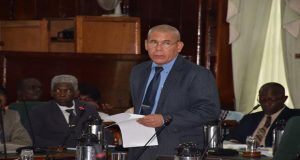“DEEP-rooted cultural and systemic change” is needed to combat the Human Immunodeficiency Virus (HIV), Public Health Minister, Dr George Norton said as he addressed the 37th Meeting of the UNAIDS Programme Coordinating Board in Geneva, Switzerland on Monday. He explained that while the Latin America and Caribbean (LAC) region has set ambitious targets for the period 2020-2030, “deep-rooted cultural and systemic change” is required to create a dent on stigma and discrimination, in addition to the provision of prevention services that will benefit all.

“Importantly, people who are most vulnerable must be empowered and must continue to be at the centre of our response. People living with HIV must continue to take prominence in this regard,” the Public Health Minister admonished.
Whilst optimistic, Minister Norton said he assured that the LAC region will expend all efforts in ending AIDS by 2030, stressing that “no one will be left behind.”
In Rio, Brazil last August, the LAC held its second HIV forum, during which the targets established for preventative measures were instituted for the elimination of stigma and discrimination within the region, with emphasis placed on youths.
In alluding to the performance of UNAIDS, Minister Norton said he encouraged by the pace in which UNAIDS is executing its mandate with respect to the Sustainable Development Goals (SDGs).
In endorsing the position put forth by the Honourable Timothy Harris, Prime Minister of St. Kitts and Nevis, Minister Norton said ending AIDS requires a response that is “interwoven and interdependent on the SDGs.”
Dr Harris, during a UNAIDS Symposium held at the United Nations (UN) Headquarters in New York in September, committed Caribbean leaders to pursue ending the HIV/AIDS epidemic by 2030. “We in the Caribbean wholeheartedly support the Global Strategy proposed by UNAIDS to achieve the bold aspirational goals of ending HIV/AIDS, which align with the global health targets in the 2030 Sustainable Development Goals (SDGs) approved by the UN,” Dr Harris had said.
In keeping with the commitment made by Dr Harris and the work of UNAIDS, Minister Norton said he is “pleased at the levels of prominence that is given to the youth-led accountability,” adding that “not only must there be youth-led accountability, but we too must be accountable to our youths.”
Additionally, he made it known that he has closely reviewed the Addis Abbaba Action Agenda, and as such appreciates the significance of the discussions. “At country levels, governments are working assiduously to ensure that there is greater country ownership, however the notion of innovate financing is critical to many of our countries. Building private-public partnerships are significant in moving towards 2030.”
In lamenting the importance of private-public partnerships, he pointed out that the Caribbean has been fortunate to have this engagement through the Caribbean Business Coalition on HIV and AIDS, and the Guyana Business Coalition on HIV and AIDS. “Mr Chairman despite the progress made in involving the private sector, there has to be greater traction. The private sector must be our partners with policies that ensure equal opportunities for all and denounce stigma and discrimination. There must be systems thinking within our private sectors as key partners that will ensure we achieve the sustainable development goals and by extension ending AIDS.”
During the opening session, UNAIDS Executive Director Michel Sidibé addressed the Board, giving an update of the progress made in the AIDS response as well as outlining the challenges of and opportunities for fast-tracking a global movement to end the AIDS epidemic by 2030.
According to Mr Sidibé the PCB meeting, which will conclude on Wednesday, is being held at a critical time, pointing out that it is taking place shortly after UN General Assembly adopted the SDGs that will drive the development agenda for the next 15 years. He said it is critical to renew the global commitment to end the AIDS epidemic as a public health threat. “The countdown to 2030 has started and calls on us to work in different ways,” he said.
The PCB will be considering the UNAIDS 2016–2021 Strategy during its meeting. The thematic segment will take place on Wednesday, and will focus on shared responsibility and global solidarity for an effective, equitable and sustainable HIV response for the post-2015 agenda.



.jpg)









